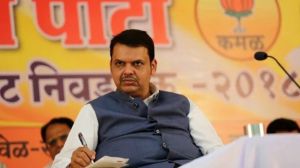Why BJP fall made China bosses sit up
When the Indian electorate threw out the BJP-led coalition last May, the Chinese government, like other chancelleries around the world, was ...

When the Indian electorate threw out the BJP-led coalition last May, the Chinese government, like other chancelleries around the world, was surprised but quickly adapted to the new realities in Delhi. But the shocked political leadership of the Chinese Communist Party CCP wanted to know why the BJP lost the elections and ordered a study, informed sources here say.
The CCP is deeply concerned about the prospect of 8216;8216;regime change8217;8217; whether induced by external forces like the US or internal convulsions.
Washington8217;s current rhetoric on promoting democracy and a series of 8216;8216;colour revolutions8217;8217; in Central Asia and the Middle East, have intensified the effort here to understand the dynamics of 8216;8216;regime change8217;8217; and how to avoid it in China.
After a series of theoretical studies about political change in a number of countries, including India, the CCP came up with the slogans of 8216;8216;building a harmonious society8217;8217; through 8216;8216;scientific development8217;8217; at the end of last year.
As a full-fledged political campaign led by the CCP unfolds, 8216;8216;scientific development8217;8217; and 8216;8216;harmonious society8217;8217; have become the buzzwords here. Whether it is a speech on technology or Tibet, leading cadres of the CCP pepper it with the two phrases. Mind you, 8216;8216;scientific development8217;8217; and 8216;8216;harmonious society8217;8217; are not about the familiar debate in the Third World about 8216;8216;growth versus justice8217;8217;. That, analysts here say, is for the poor sods stuck below annual per capita incomes 500 US dollars.China8217;s new slogans relate to those have crossed the per capita threshold of 1000 US dollars and are about addressing the economic, social and political consequences of rapid growth. China, which has seen frenetic growth of nearly 9.5 per cent in the last 25 years, is now facing up to the downside 8212; regional inequality, social instability, economic inefficiency and environmental degradation.
Deciphering the slogans, a recent article in the Beijing Review said 8216;8216;when its per capita GDP stands at US1000 to US 3000, a society is likely to see major changes.8217;8217; 8216;8216;During this period, urbanization develops swiftly, the gap in incomes continues to grow and social contradictions become more complicated8217;8217; it is likely to be disturbed by social unrest, a waste of resources, unbalanced ecological conditions and economic stagnation, the Review says. The CCP knows slowing down growth will only accentuate the problems. What is needeed is 8216;8216;scientific development8217;8217;, defined as comprehensive, coordinated and sustainable. The pursuit of scientific development, as opposed to the chaotic growth of recent decades, CCP believes, 8216;8216;will lead to a harmonious society in which widespread affluence alleviates the inevitable social tension arising from rapid economic change8217;8217;, an analyst here summing of CCP8217;s latest campaign.
How does China go from here to there? By 8216;8216;putting people first8217;8217;, says Hu Jintao, the CCP boss and President of China. Underlying the emphasis on people is a huge policy agenda, of bringing better governance to people, giving them more opportunities, ending regional and rural-urban imbalances, and providing more political space to ethnic minorities.
Underlining Mao8217;s dictum that a single spark can set the prairie afire, Hu and his colleagues are emphasising comprehensive treatment of law and order and effectively utilising the dual strategy of cracking down as well as prevention of dissent, with an emphasis on the latter.
In a bid to defuse growing internal social tensions, the CCP is emphasising relief to farmers and reviving the old campaigns to glorify 8216;8216;model workers8217;8217;. The CCP wants to ensure that a Shining China belongs to millions of peasants and migrant workers and not merely to the Red capitalists in China8217;s booming cities.
CCP8217;s new focus on stability, at the heart of building a harmonious society, has disappointed urban intellecuals who have been hoping for greater political freedoms under the leadership of Hu Jintao. But Hu and the fourth generation leadership of China have inherited a grave challenge8212;of ensuring that the CCP does not lose control over the forces it has unleashed in the last 25 years. Setting the house in order, through scientific development and building a harmonious society, is the highest priority then for Hu.
- 01
- 02
- 03
- 04
- 05































